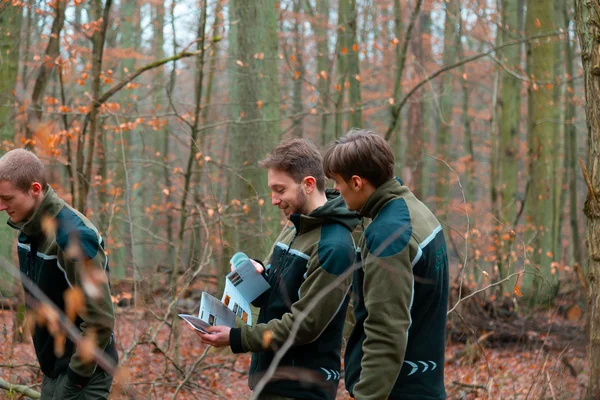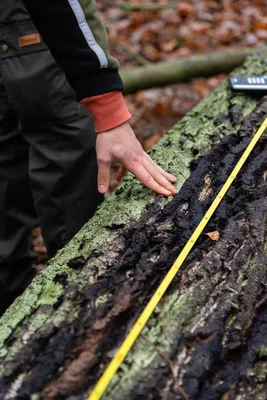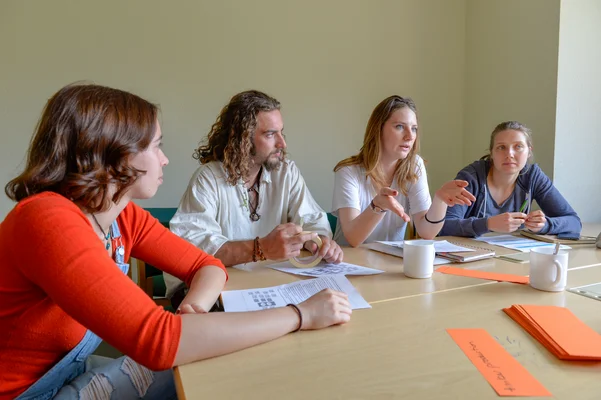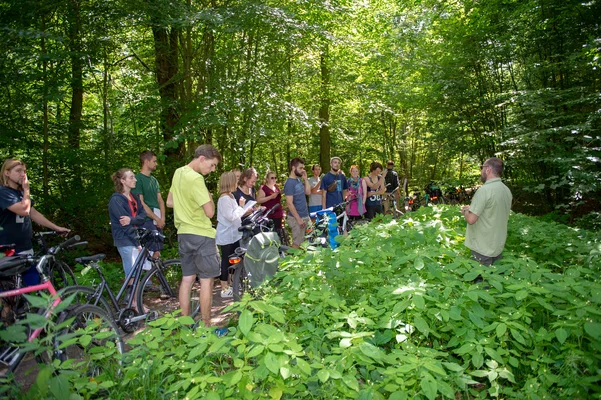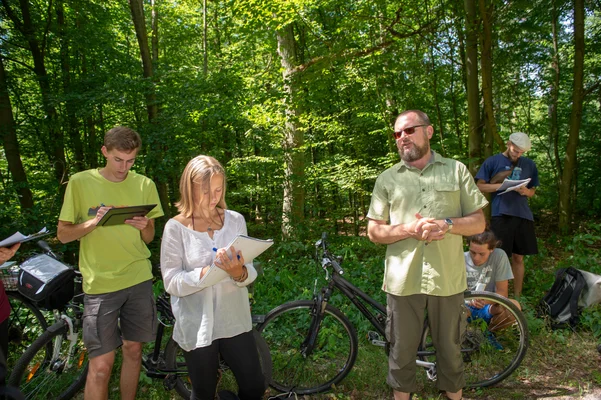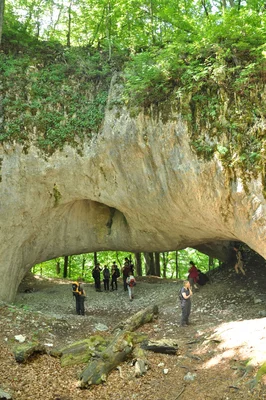Individual study contents
The degree programme consists of six semesters. You can earn 30 ECTS per semester in compulsory modules and an additional selection of elective modules. You can have further academic content such as specialisation modules credited according to the European Credit Transfer System. This results in a total of 180 ECTS for the Bachelor's degree programme IFEM.
Modules per semester
In the first and second semester, basic knowledge of natural sciences and socio-economics is taught.
You acquire basic knowledge of morphological structures, cytology, anatomy, physiological processes and systematic relationships of plants with a focus on woody plants.
You are enabled to actively participate in the discussion on current issues and concerns of sustainability, natural resource management and nature conservation. Your knowledge is based on a complex and integrative consideration and appreciation of ecosystems in which humans are embedded.
The module consists of soil science and site and vegetation ecology.
After completing the module, you will have basic knowledge of the origin, the structure and the characteristics of different (forest) soil types and will be able to use this knowledge to understand the functions of soils in the ecosystem. You will be able to assess forest sites based on climatological, geological and pedological characteristics and on vegetation survey.
The module consists of zoology, wildlife biology and entomological fundamentals.
You will be able to recognise relevant animal groups and explain their function in the (forest) ecosystem. You will also gain an overview of the biology and ecology of wild animals with a focus on mammals. The focus is on knowledge of wildlife biology and an overview of the way of life of native wild animals relevant to wildlife management. Participants also learn the basics of insects. The aim is to familiarise you with the ecological position and functional diversity of insects.
The module consists of the parts Introduction to Socioeconomics and Social Science Methods.
You will be ably to apply socioeconomical principles in the context of economic relations and the management of forest and forest service businesses. You will be capable to apply quantitative and qualitative methods in social sciences; moreover, you know how to interpret the results frome such analyses.
It is generally possible to obtain a hunting licence as part of the degree course. This is associated with additional costs.
During the degree programme, you will take the corresponding elective modules for the theoretical content. The practical training takes place parallel to the degree programme. Both programmes conclude with an examination.
In the first and second semester, basic knowledge of natural sciences and socio-economics is taught.
The module consists of ecology, dendrology/plant identification and wildlife management.
You will learn to translate ecological knowledge relating to ecosystem analysis, management and sustainable forest use into practical applications. By analysing forest sites with different forms of management in practical field work, you will learn to assess the impact of human activities (e.g. silviculture) on the complex forest ecosystem and its multifunctionality. You will be able to use identification literature and have a basic knowledge of botanical species. You will be able to establish the link between basic knowledge of wildlife ecology and application-orientated practical action and assess the effects of your actions on wildlife populations and their habitat and the entire ecosystem.
The module consists of the parts Data Management, Geodata & Geoinformatics and GIS Exercises and Tutorial.
In the context of practical application, you will be able to create data tables with their fields and corresponding field data types and to recognize structures and dependencies between the data. You will be able to construct functions and expressions for data evaluation, interpret results and work on various scientific questions. Students know possibilities and tools of data representation and are able to create structured result outputs. You will have basic knowledge in the field of applied geoinformatics which enables you to acquire practical skills in dealing with spatial data and the use of relevant GIS softwore for the use in modern (digital) forestry. You will have basic theoretical knowledge in the field of applied geoinformatics and you are able to understand practical forestry applications of digital spatial data and automatic sensor data in forestry.
The module consists of the parts dendrometry, biometry and forest growth.
You will have basic knowledge in environmental data analysis. You will have knowledge about quantitative growth processes of single trees and forest stands. You have knowledge of the influence of natural and anthropogenic factors on growth, mass and value yield, stand stability and stand structures. The influence of silvicultural measurements can be assessed in a differentiated way, simple estimation and planning tools based on forest growth science can be applied. Students are skilled for the efficient and independent investigation, processing and analysis of simple mainly single tree-focused spatial forest data.
The module consists of the parts forest work, timber harvest and forest development and wood as a raw material.
You will be able to plan and supervise manual forest operations according to current standards and to contribute to the planning and implementation of resource protecting, sustainenabled harvest planning in forestry in an international context. Furthermore, you will have basic knowledge in designing rural roads for forest management and recreation purposes in an international context.
You know the structure and composition of wood, as well as relevant wood attributes. You know different ways of utilization of wood and are able to sort and provide wood based on this knowledge.
It is generally possible to obtain a hunting licence as part of the degree course. This is associated with additional costs.
During the degree programme, you will take the corresponding elective modules for the theoretical content. The practical training takes place parallel to the degree programme. Both programmes conclude with an examination.
The module consists of the module components field exercises in site and vegetation ecology (2nd semester) and field and laboratory training in soil science (3rd semester).
You will be enabled to classify soils in the field and to derive their site ecological properties with the help of field methods. In addition, you will be able to assess forest site conditions with the help of vegetation surveys. On the basis of these site ecological properties recommendations for the selection of tree species are derived.
You will be able to understand the basic physiologlogical processes of plant life and apply their importance to practical forestry and forest protection. You know the fundamentals of applied plant ecology and apply them in practical exercises.
You will be able to communicate in the target language at the specified level, both orally and in writing, understand authentic content, and successfully prepare for careers or further education at home or abroad through intercultural and social understanding
You can find the current offer of language courses at the Language Centre.
You will be enabeled to analyse the situation of exemplary ecosystems and interprete and apply this knowledge to management.
You will learn on an exemplary basis of a region in a chosen transformation country to what extent socioeconomical and political transformation processes induce changes in the ecosystem and how corresponding knowledge is relevant to ecosystem management. You are enabled to identify and implement ecosystemic and socioeconomic indidators for the evaluation of potential changes in the system.
You will be able to recognize and assess correlations between habitat and species, their biology and the environment. The theoretical fundamentals of the sub-module in wildlife biology and zoology will be strengthened through practical exercises. You will acquire applicable knowledge of species (wildlife, birds, invertebrates, and plants).
The module consists of the module components Student Research Colloquium and International actors in (forest-
) ecosystem management.
You will be enabled to analyse and critically discuss recent projects in forest ecosystem management in different regions of the world, considering relevant stakeholders. You will have deepened your political, socioeconomic, geographical and ecological understanding in the context of forest ecosystem management, obtaining a broad and integral vision of the existing challenges and possible approaches of local actors.
You will get to know important international players in forest ecosystem management. You will be able to analyze and critically reflect on the goals and approaches of the organizations. You will be able to categorize the actors in the international discourse of ecosystem and natural resource management and understand their role.
The third semester focuses on teaching and implementing skills for sustainable management and conservation of global forest ecosystems.
The module consists of the module components Environmental economics and Environmental development policy and law.
You will know the fundamentals of environmental economics and are enabled to classify and communicate environmental-economic issues. You will know the basic elements of the two sectoral political fields with regard to environment and development, taking into account postcolonial history. You will be able to actively participate in public debates and write statements and other contributions, e.g. for organisation working in this field. You will be able to develop arguments and are trained in participating in and moderating conflicts.
The module consists of the module components Applied ecology, Fundamentals of silviculture and Forest mensuration.
You will investigate and analyse all elements of a (forest-)ecosytem. You will gain methodological knowledge, understand complex interactions and interprete results of scientific studies with regard to the effects of forest management on the multifunctionality of forest ecosystems. You will obtain a detailed understanding about relationships within forest ecosystems and between these ecosystems and their environment under the influence of different management strategies. You will be able to transform the information you gathered from basic forestry and ecological subjects into hands-on, in-depth knowledge on the fundamentals of how to develop and sustainably manage multi purpose forest ecosystems under a variety of societal, economic, and ecological constraints. You will have the ability to methodically prepare and carry out basic forest taxations with different objectives and to analyze and interpret the collected data.
Based on the principles and instruments of adaptive management as well as ecosystem-based strategies, you are enabled to propose ecosystem-based strategies for sustainable development in selected areas.
The module consists of the module components Applied silviculture and ecosystem development and restoration and Forest inventory.
Your are enabled to develop, evaluate and put into practice forest management strategies and treatment programs based on socio-economic information and knowledge of forest ecology, forest growth theory, site assessment and silviculture. Specific silvicultural techniques are known and can be applied to concrete situations in forest stands according to given objectives. You will learn about the possibilities and limits of promoting forest development after calamities and under conditions of climate change. You will be able to critically reflect on corresponding heuristics for the promotion of ecosystem functionality. Students are familiar with basic methods and techniques of forest inventory and forest management. You know inventories of different objectives on different spatial scales. You will be able to design, apply and evaluate classical forest and forest ecological inventories for different objectives. You know internationally suitable forest management procedures.
The module consists of the module components field exercises in site and vegetation ecology (2nd semester) and field and laboratory training in soil science (3rd semester).
You will be enabled to classify soils in the field and to derive their site ecological properties with the help of field methods. In addition, you will be able to assess forest site conditions with the help of vegetation surveys. On the basis of these site ecological properties recommendations for the selection of tree species are derived.
You will be enabled to identify fundamental biotic and abiotic cause-and-effectrelations in plant diseases and to apply methods of environmental monitoring
The module consists of the module components Public relations (3rd semester) and Forest environmental education & Education for Sustainable Development (4th semester).
You will be enabled to become multipliers for nature and environmentally friendly action and acquire tools for dealing with the media and the general public. You will be able to identify and involve various forest-relevant stakeholders and their interests, as well as use appropriate conflict resolution strategies.
You will be able to understand the basics of wildlife biology and hunting in an ecosystem context and, if necessary, to apply them in practice.
The module consists of the module components Damage diagnostics of woody plants and Tree care and assessment.
You will be enabled to recognize damage to woody plants and to differentiate between them with regard to their cause factors. You will learn the scientific and legal basics of the care and restoration of trees and their locations.
The module consists of the module components Microbiological laboratory pratice and Laboratory standards and
experimental principles.
You will be able to plan scientific laboratory experiments under guidance and supervision and to conduct and evaluate them largely independently. You will be familiar with the laboratory activities required for this. You will be able to scientifically reflect and appropriately present the results of your independently designed experiments.
You will know the specific safety standards and procedures of routine laboratory operation. You will be familiar with the basic equipment of a microbiological laboratory and are capable of performing microbiological experiments on a scientific level.
You will be able to understand agroecological interrelationships, political framework conditions and potentials of different agroforestry systems and, above all, to assess and evaluate them with regard to their practical applicability. You will understand the relevance of the parameters collected on the agroforestry experimental plot and are able to plan, conduct and evaluate a corresponding experimental setup.
You will be able to understand and apply the principles of academic writing and presenting.
You will be able to communicate in the target language at the specified level, both orally and in writing, understand authentic content, and successfully prepare for careers or further education at home or abroad through intercultural and social understanding.
You can find the current language offer at the Language Centre.
You can also select elective modules from certain other HNEE degree programmes or from international partner universities that are thematically related to the degree programme.
In the fourth semester, you can study a semester abroad at one of our partner universities in Europe, North or South America (limited places!). We advise that you also complete the compulsory internship of the fifth semester there to deepen your potential research. If you stay in Germany, these modules are available for selection.
The module consists of the module components Urban forestry and Community based forestry and agroforestry.
You will be able to analyze and systematize the specific social demands on urban and peri-urban forests and develop management strategies from them. The focus is on the ecosystem services that contribute to the resilience of cities as well as the different actors that are relevant for the management of urban green.
You will be able to use guiding principles for sustainable management of commons resources and promote agroforestry systems.
The module consists of the module components Climate change - causes and scenarios and Environmental governance.
You will learn the physical fundamentals of climate change, the anthropogenic drivers of rapid climate change since the beginning of industrialisation as well as the impacts of climate change at present and in future. You will get to know social and political sciences theories and concepts of environmental governance and climate policy. Social structures, institutions and actors are explained as a basis for deepening topics such as collaboration, protest behaviour and policy action.
In contrast to state regulatory law, you will know the economically oriented approach of certification systems, especially in the forestry sector, and its most widespread systems and their differences. You will be able to understand and apply the basics of environmental law as well as more detailed species and habitat protection regulations and environmental assessment.
The module consists of the module components Intercultural communication and Extension methods in international cooperation.
You will understand different concepts of culture, are aware of communication barriers and how to overcome these, by self-reflection and increased awareness of cultural differences. You will be enabled to distinguish between forms and channels for extension work and can apply these for real world cases.
In this module you will acquire enhanced methodical knowledge and advanced technical skills analyzing
and integrating digital sensor data and practical applications in forest ecosystem analytics. You will get the
theoretical background and study real-case experiences from digital (3D) forest monitoring examples and
management use cases.
You will be able to implement technical, methodological and planning aspects of relevant forestry work.
The module consists of the module components Forest road development for recreational use and Forest road construction.
You will possess the basic knowledge required for the planning of recreationally relevant development
infrastructure and are able to implement this knowledge in concrete planning measures. Furthermore, you will possess practical knowledge for an adapted forest path construction and are able to carry out a road project planning.
You will be able to understand agroecological interactions, political framework conditions and the potential of various agroforestry systems and, above all, to assess and evaluate their practical feasibility. You will understand the relevance of the parameters collected on the → agroforestry trial area and are able to plan, carry out and analyse a corresponding experimental setup.
The module consists of the module components Entrepreneurship and Enterprise management.
You will develop ideas for starting a business. You will be able to establish and successfully manage your own
company in an international context. You will be able to analyze companies in terms of their economic performance, apply models to optimize economic processes and evaluate states.
By reflecting on the experiences gained in the context of sustainable engagement in connection with the intensive examination of subject content, you will be enabled to develop subject-specific and interdisciplinary, personality-building competences, such as communication competences, self-efficacy, the ability to work in a team and others. You will learn about the importance of civil society engagement and can assess and reflect on the opportunities and limits related to your respective subject area.
You will be able to communicate in the target language at the specified level, both orally and in writing, understand authentic content, and successfully prepare for careers or further education at home or abroad through intercultural and social understanding.
You can find the current language offer at the Language Centre.
You can also select elective modules from certain other HNEE degree programmes or from international partner universities that are thematically related to the degree programme.
In the practical fifth semester abroad, you will test and deepen your knowledge and skills from your studies. All full-time students with German language skills must complete their internship on forest ecosystem-related topics abroad.
You will be enabled to participate in international projects in the field of multifunctional and sustainable management of forest ecosystems. Participation in scientifically sound, practice-oriented projects with concrete reference to the forest and the study programme.
In the sixth semester you will write your Bachelor's thesis based on research projects and take further, in-depth additional modules and complex project work.
You can write a scientific paper on a subject-related topic of your own choice, formulate working hypotheses and develop methodological approaches. You analyse and present data scientifically. You can evaluate and critically discuss conclusions. You know the principles of good scientific practice.
You will be able to derive and document approaches to sustainable forest cultivation based on a specific section of forest. In doing so, you rely on data from site and forest growth science as well as spatial data of the forest objects to be analysed (including forest inventory). The project centres on (silvicultural) planning at stand and operational level and its implementation with specific silvicultural measures. The competences are supplemented with tasks from the areas of recreational planning and other special planning as well as the planning of measures to adapt forests to climate change.
You will be able to assess the potential and current impact of UNESCO biosphere reserves as places of learning and model regions for ecosystem-based sustainable development and work out the current management challenges on the basis of selected examples.
Forest landscape restoration Elective module
You will be able to apply Forest Landcape Restoration (FLR) techniques in different disturbance contexts such as reforestation, rehabilitation of degraded areas, water management to restore basic (forest) ecosystem functions and contribute to improving the quality of life of people in different ecozones of the world.
You will be able to familiarise yourself with the currently significant alien and invasive harmful organisms and serious, complex disease phenomena. You will be familiar with national and international legal norms and standards as well as the specific monitoring, prevention and eradication measures of plant quarantine.
You will be able to apply the basics of problem solving and learn to identify framework conditions and variants and to formulate target hypotheses using case studies. You will be able to recognise assignments (financial planning, work planning, project proposal) and will be able to define the framework conditions of your research topic. You will be able to formulate research proposals in group work and present your results. You will apply the knowledge of plant ecology, dendrochronology, meteorology, statistics, inventory, database management, GIS, silviculture and financial planning that you have acquired in your previous studies and in the seminar and lecture part of the module in case studies.
You will be able to communicate in the target language at the specified level, both orally and in writing, understand authentic content, and successfully prepare for careers or further education at home or abroad through intercultural and social understanding.
You can find the current language offer at the Language Centre.
You can also select elective modules from certain other HNEE degree programmes or from international partner universities that are thematically related to the degree programme.
